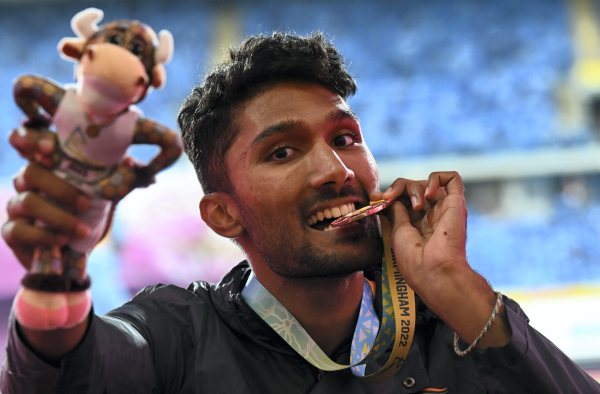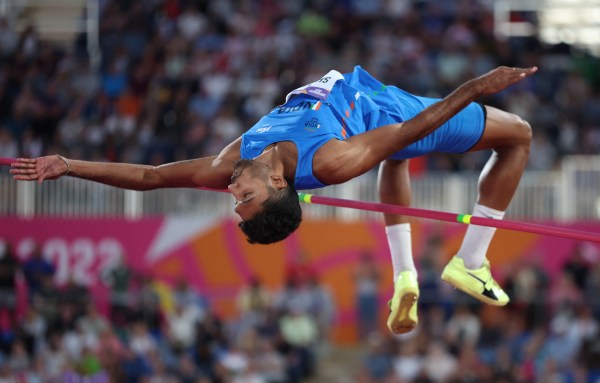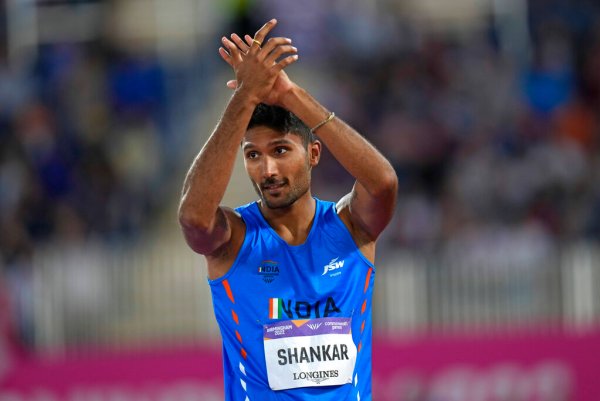 India's Tejaswin Shankar, bronze, celebrates during the medal ceremony for the men's high jump during the athletics in the Alexander Stadium at the Commonwealth Games in Birmingham, England, Wednesday, Aug. 3, 2022. (AP Photo/Alastair Grant)
India's Tejaswin Shankar, bronze, celebrates during the medal ceremony for the men's high jump during the athletics in the Alexander Stadium at the Commonwealth Games in Birmingham, England, Wednesday, Aug. 3, 2022. (AP Photo/Alastair Grant) Because the federation didn’t initially select Tejaswin Shankar to the Commonwealth Games squad, and he had to go to court to even get the chance to compete in Birmingham, you expect a flood of rancour to unload from the young man soon after he wins India’s first-ever bronze in high jump. But we forget that when stepping onto their field of play, athletes empty their minds of all needless fluid thoughts – like airports security unemotionally upturn your bottles of water.
Some pretty wild thoughts of dire scenarios did cross his mind on Wednesday, when the tall Delhi lad clinched bronze with a jump of 2.22 m on countback. But none of them involved finger-wagging or any score-settling against a federation he had dragged to court for being plainly anal. The wildest stream of thought will immediately endear him to you, because surely everyone has felt “that” fear.
“Oh, the javelin event of heptathlon was going on during my final and at one crazy moment when I looked up in the sky it did cross my mind that what if the javelin (from the other end of the stadium) hurled by one of the women, hits and pierces through me! If Neeraj Chopra was around, that might have even happened,” he recalls, of the irrational paranoia he quickly waved away since his buddy wasn’t even competing in Birmingham.
 India’s Tejaswin Shankar celebrates after taking the bronze medal in the men’s high jump during the athletics in the Alexander Stadium at the Commonwealth Games 2022, in Birmingham, UK, Wednesday, Aug. 3, 2022. (PTI Photo/R Senthil Kumar)
India’s Tejaswin Shankar celebrates after taking the bronze medal in the men’s high jump during the athletics in the Alexander Stadium at the Commonwealth Games 2022, in Birmingham, UK, Wednesday, Aug. 3, 2022. (PTI Photo/R Senthil Kumar) Focus jogged back to high jump, Tejaswin was on his way again. Though a bunch of distractions popped up all around – medal ceremonies were calling for attention as national anthems rung out, the 10,000 m final was raising one din as a Scottish runner was threatening to dislodge a pair of Kenyans, javelins were flying vaguely in his direction ofcourse, and a camera rig following the 10,000 m stragglers, was start-stopping intermittently. “High jump medals are rarely about how high you can go. They are about how high you can go, despite these distractions,” he would say.
Subscriber Only Stories
He had jumped more than 2.22 m at his last CWG (2.24m) and yet finished 6th at the Gold Coast. Australian Brandon Starc won in 2018 with 2.30-plus. On Wednesday, the entire field couldn’t go past 2.25m. Tejaswin, four years wiser and pickled in tactics after his stint at Kansas’ NCAA, knew the Aussie and Kiwi Hamish Kerr would be trouble. There was also Donald Thomas, who won high jump at the Delhi 2010 Games, the Bahamian always dangerous in tripping up youngsters. But Tejaswin Shankar had a plan.
Cautious, calculated
Taking the bus from the athletes’ village to the Alexander Stadium, Tejaswin had already done what he told himself he ought never to do: allow his hyper mind to race ahead of itself. Only, he was self aware, and began chanting ‘Process, Process, Process’ the moment he realised he was already imagining himself on the podium.
“My mind is strong but it races fast,” he would explain later, of his mind reaching the podium before the feet did. “I had to slow myself down with cue words. Pinch myself back to reality. And stay in the moment.”
He had done well in keeping himself in contention, knowing fully well a countback could come into play, i.e. the fewest number of attempts on the lower jumps – he got to 2.10m, 2.15m and 2.19m on his very first attempts, consciously. “It’s what I was mumbling to myself, looking like one fool out there. But it was important to not miss the bar, or you’d have had Donald Thomas (who also finished at 2.22m, but took more attempts) sitting here,” he quipped. Local Joel Clark-Khan was also stuck on 2.22m, but again having consumed more attempts than the Indian’s careful clean sheets. No X’s. Only O’s.
Another factor was to come into play, the smart Tejaswin alert to it, in a jiffy. “I knew the weather would start getting cooler here by 7 pm. So it was important to pull on the tracks, keep warm if you are not used to the chill in the air when jumps start going awry. Another reason why the first few bars could not be missed,” he recalls.
 India’s Tejaswin Shakar in action on Wednesday. (REUTERS/Phil Noble)
India’s Tejaswin Shakar in action on Wednesday. (REUTERS/Phil Noble) By the time the bar was on 2.25m and Tejaswin did indeed miss his first two attempts, his earlier clean go’s had ensured the bronze. “I was waiting to see if Don Thomas missed on 2.25m. Once i had secured the bronze, I didn’t want to settle for it. So I went for gold, attempting 2.28m,” he would explain.
The Indian would pass on his last shy at 2.25m, and put Kerr and Starc under pressure by choosing the one-or-done option of nailing 2.28m, and get into gold contention. The confidence had come solely from his earlier strategy of being secure in a situation of a countback (fewer attempts needed).
The 2.28m was missed though, and the bronze was taken. “Some days you get it, some you don’t. Some days I made it happen, today I couldn’t,” he would say later, adding the bronze meant a world to him given he didn’t want to return empty handed. “I’m going back with some hardware. So all the struggles have been worth it. I’ll celebrate it with my mother who’s been up all night watching me.”
The federation tussle
In whatever was their wisdom, the Athletics Federation of India chose initially to not pick Tejaswin. Backed by his lawyer parents, the Delhi youngster went to courts and got an order in his favour. “The moment I saw the entry list, I knew i had the bronze at the very least. Don’t mean to be cocky,” he would say. But the organisers had to be persuaded to burgeon India’s quota. “I’m grateful to the IOA and AFI for helping me get in finally,” he would say, though five days back, he was sitting at home watching the opening ceremony uncertain about coming to Birmingham even.
His time with NCAA shaped his mindset for precisely such scenarios. “A lot of credit to the NCAA I know there will be good days, bad days, horrible days.” The bronze was dangling right there, but Tejaswin was the first to know it could all dissipate if he messed up. “If I didn’t get the jump, I’d be going nowhere. I was aware of that.”
He had been determined to not allow the controversy to spill over into his mindspace. “The moment I got my visa, I adopted a positive mindset, and removed all negative thoughts. Because physically, mentally, you have to be focused on the jump. Make things happen. I had my opportunity. I didn’t want to change any routine.” So he stuck to the process.
 India’s Tejaswin Shankar celebrates after taking the bronze medal in the men’s high jump during the athletics in the Alexander Stadium at the Commonwealth Games in Birmingham, England, Wednesday, Aug. 3, 2022. (AP Photo/Alastair Grant)
India’s Tejaswin Shankar celebrates after taking the bronze medal in the men’s high jump during the athletics in the Alexander Stadium at the Commonwealth Games in Birmingham, England, Wednesday, Aug. 3, 2022. (AP Photo/Alastair Grant) Walked in, taking in the stadium vibe. Measured his runway with tape. Checked rules with officials. Sat with his back to the fellow jumpers watching them on the big screen. Visualised a jump before every attempt. No mistakes on the early attempts. Mind leashed after it began to go astray.
With the 10000 m picking pace in his peripheral vision, he knew a stop-start routine was to kick in, because runners keep lapping around right from where the jumpers are starting out. It’s where he would enlist the crowd.
Not showman, just feeding off crowd
Tejaswin sees himself as a reserved man, who often acts uncharacteristically on the field – or feels liberated enough on the field to (though tough to classify jumps as field or track). “Sometimes I watch my videos and think to myself I’m such a fool. I’m embarrassed of what I do,” he says, a tad too harsh on himself. “But emotions take over.”
When jumpers engage with the crowd, getting them to clap in unison, it is one of sport’s most brazen attention-seeking hooks. But Tejaswin offers an interesting insight. “You desperately look for motivation, when you are feeling hollow inside. That’s when you need the crowd,” he explains.
On Wednesday, things looked like going swimmingly well. But something had jarred. On the first 2.10m jump, Tejaswin’s leg had clipped the bar a tad, though the horizontal stayed put and he exhaled, relieved believing he had lucked out. “That should’ve been a miss. But the bar stayed,” he recalls, as he jumped a little wider than usual.
In between his jumps, he reaches out to every competitor, patting their backs, striking a conversation with Malaysian Nauraj Randhawa, consoling Shaun Miller. The talking keeps him centred, stops unnecessary thoughts from entering his mind. The noise fills a void he feels after the 2.10 jump clipped the bar and left him coming undone.
Later, the medal around his neck, Tejaswin is refreshingly unreserved. When journalists are asked to stick to 3 questions each, he steps in and says, “no ask 5. It’s not everyday I win a CWG medal!” On his medallists’ celebration lap, he shakes hands with every fan, signs every autograph requested. “People kept saying Tejaswin this, Tejaswin that. But I never had a big medal to back that up. This CWG is important. I value it,” he would add.
Smitten by decathlon, Tejaswin reckons the various events will keep him mentally fresh and improve his endurance going forward. He wants the word to go out that he has no sponsor, so he can start competing in higher grade tournaments now that his College is done. He wants his pathbreaking CWG bronze to inspire at least one kid from his school or state to take up high jump. “I know I’m not as big as Neeraj. But even if one kid picks up high jump I’ll be happy.”
Hearing of Indian athletes winning in other disciplines, Tejaswin had been keen to open India’s account in Track & Field. A Nigerian journalist would declare India’s chances finished after hearing Chopra wasn’t fetching up in Birmingham. Tejaswin was determined to prove that wrong. “CWG is a big competition. Anyone can win it. And the next chance is 4 years hence. Next year is World’s again. This will help me with ranking points.”
For someone whose jump margins are decided at the highest elevation he reaches, arched over the bar, Tejaswin has early premonitions – or technical instincts – about how the jump will go. “After the 3rd step of my runway, on my 5th step I generally know if my jump will be good or not. If I float on that step, then the jump goes bad. It’s when accelerating on the curve. Once you take off, you have to go through with jump. But I know in the 5th step itself,” he explains, of how he plots and picks signs of success early.
Ofcourse, you can abandon the attempt if you don’t run out of time – one minute. But on Wednesday winning India’s first ever bronze, Tejaswin Shankar set up his medal pretty early in the finals. Never mind the gory thoughts of javelin piercing him wafted across like a dark cloud.
- The Indian Express website has been rated GREEN for its credibility and trustworthiness by Newsguard, a global service that rates news sources for their journalistic standards.

